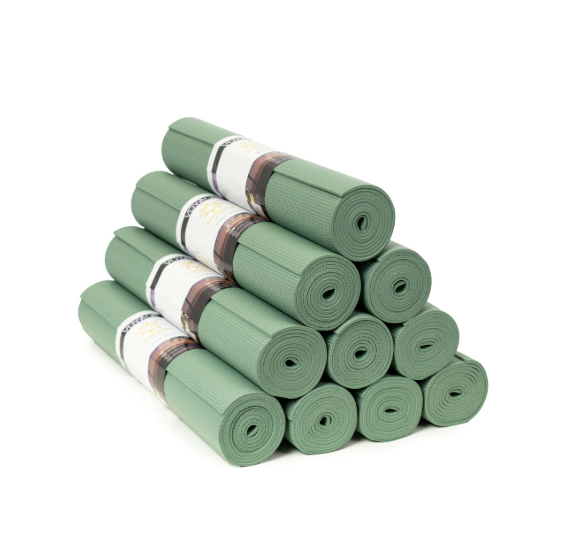The yoga mat industry is changing fast. More people want sustainable options instead of traditional PVC mats. In 2025, the global green yoga mat market is projected to reach $15.2 billion, growing at 8.3% per year.
Why Green Yoga Mats Matter

Traditional yoga mats contain harmful chemicals like phthalates and heavy metals. These substances can leach into your skin during practice. They also take hundreds of years to break down in landfills.
I recommend green materials because they offer clear benefits:
-
Natural rubber provides superior grip and breaks down within 1-2 years
-
Cork resists bacteria and comes from renewable bark harvesting
-
Jute absorbs moisture well and you can compost it
-
TPE (Thermoplastic Elastomer) breaks down 10x faster than PVC
What This Guide Covers
I will examine the leading green yoga mat manufacturers in 2025. I’ll explore their production processes, material choices, and sustainability certifications. You’ll discover which factories offer the best mix of quality, environmental care, and competitive pricing.
Are you a yoga studio owner, retailer, or conscious consumer? Understanding these yoga mat manufacturers helps you make smart sourcing decisions.
What Makes a Yoga Mat Green
A green yoga mat is more than marketing talk. It uses sustainable materials, safe production, and ethical practices. I’ll break down what makes a yoga mat green.
Material Standards
What your mat is made from matters most. I suggest looking for these certifications:
-
OEKO-TEX Standard 100 – Tests for over 100 harmful substances
-
GOTS (Global Organic Textile Standard) – Verifies organic fiber content
-
BSCI stands for Business Social Compliance Initiative, a European program promoting ethical and responsible manufacturing
-
REACH is an EU regulation aimed at protecting human health and the environment from harmful chemicals
Green mats use materials that return to nature. Natural rubber breaks down in 18-24 months. Cork mats decompose in 3-5 years. PVC mats stay in landfills for 500+ years.
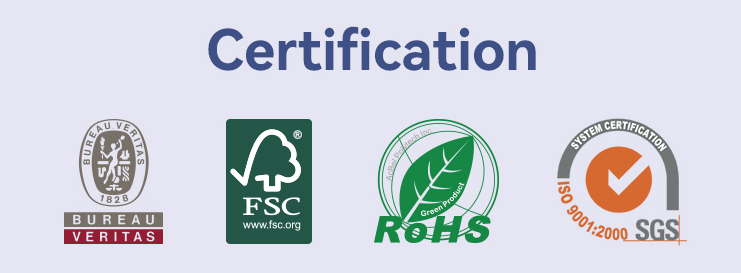
Natural and Renewable Materials
Natural Rubber Trees
Workers harvest from Hevea brasiliensis trees without cutting them down. One tree produces latex for 25-30 years. The material breaks down in soil within two years.
Cork Oak Bark
Workers strip the bark every 9-12 years. This doesn’t harm the tree. Cork oak forests absorb 14 million tons of CO2 each year. The bark grows back on its own.
Organic Cotton and Jute
Organic cotton uses 91% less water than regular cotton. Jute grows without pesticides. Both materials break down in 6-12 months.
TPE (Thermoplastic Elastomer)
TPE isn’t plant-based but you can recycle it. TPE breaks down in 50-80 years. PVC takes 1,000 years. Quality TPE has no phthalates or dioxins.
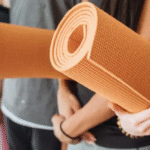
Related Reading: Discover Best Wholesale Yoga Mats For Pilates Usa: Buyer’S Guide
Safe Production
Green manufacturing removes harmful chemicals:
No PVC (Polyvinyl Chloride)
PVC production releases dioxins. These link to cancer and reproductive problems. Chlorine gas from PVC making pollutes waterways.
Phthalate-Free
Phthalates disrupt hormones. The EU banned several types. Green mats use plant-based options instead.
Zero VOC Emissions
Quality green mats pass VOC tests at less than 0.5 mg/m³. Traditional mats emit 10-15 mg/m³ of harmful vapors.
Safe Dyes and Adhesives
Look for AZO-free dyes and water-based adhesives. These stop skin irritation and water pollution.
Top Green Yoga Mat Factories
I’ve researched the leading manufacturers making genuine sustainable yoga mats in 2025. These yoga mat factories stand out for their material innovation, clear practices, and proven environmental commitments.
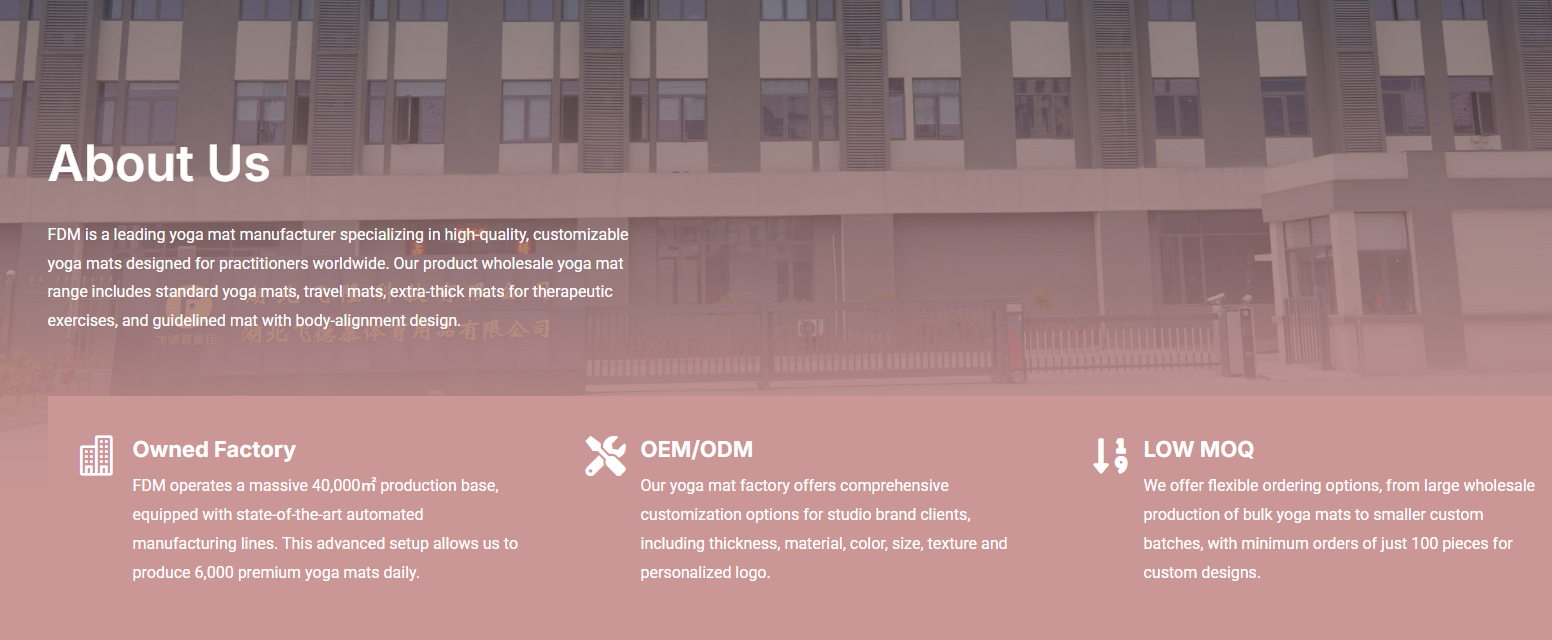
FDM Yoga (China) – Custom Natural Rubber and OEM Excellence
Location: Hubei Province, China
Specialty: Custom natural rubber mats and tpe yoga mats with OEM/ODM services
FDM Yoga runs one of Asia’s largest sustainable yoga mat facilities. They process natural rubber from certified plantations in Southeast Asia. The factory handles everything from raw latex to finished product.
What Sets Them Apart:
-
Material Sourcing: Natural rubber from FSC-certified forests in Thailand and Malaysia
-
Production Capacity: 180,000 mats per month with MOQ as low as 100 pieces for custom orders
-
Customization Options: Over 200 texture patterns, custom printing with water-based inks, private labeling
-
Certifications: Reach, ISO 14001 Environmental Management
Their signature biodegradable rubber mat breaks down in 18 months under industrial composting. The factory uses solar panels for 60% of production energy.
FDM works with studios and retailers needing branded mats. They ship samples within 10 days. Custom orders complete in 40-55 days.
Liform(UK) – Biodegradable Innovation with Plant-Based Technology
Location: London, UK
Specialty: Patent-pending biodegradable “GripForMe” material
Liforme makes mats that decompose. Their material uses natural rubber combined with biodegradable synthetic layers. The entire mat breaks down in landfill conditions within 1-5 years.
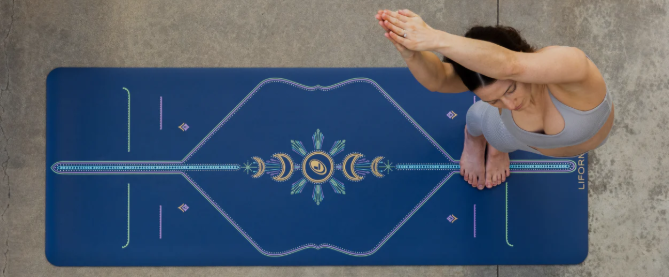
Manufacturing Process:
-
Natural rubber base from rainforest-safe sources
-
Plant-based polyurethane top layer (no PVC)
-
Water-based screen printing with certified organic pigments
-
Zero-waste cutting systems that repurpose 98% of material scraps
Key Features:
AlignForMe System: Embedded alignment markers using plant-based inks
Strong Grip: Performs in hot yoga conditions without chemical grip enhancers
Thickness Options: 4.2mm standard, 5mm for joint support
Certifications: OEKO-TEX 100, Biodegradability tested per ISO 14855
Price Point:
Retail mats sell for $140-160. The factory offers B2B partnerships for studios ordering 50+ mats at $90-110 per unit. They don’t accept small custom orders. But they provide co-branding options for established brands.
Environmental Commitment:
Liforme offsets 200% of production carbon through verified rainforest protection projects. Their packaging uses recycled cardboard and plant-based tape.
JadeYoga (USA) – Natural Rubber Pioneers with Tree Planting Program
Location: New Jersey, USA
Specialty: Open-cell natural rubber with “Trees for Mats” initiative
JadeYoga produces mats from a single material: natural rubber tapped from Hevea trees. They pioneered the natural rubber yoga mat market in 2000.

Sustainability Model:
-
One Material Philosophy: 100% natural rubber, no blends or synthetic layers
-
Tree Planting: Partners with Trees for the Future to plant one tree per mat sold (over 3 million trees planted since 2006)
-
Domestic Production: All mats made in USA facilities reduce shipping emissions
-
Tapping Practices: Sources from plantations using traditional tapping methods that keep trees healthy for 25+ years
Material Properties:
The open-cell rubber provides grip through moisture absorption. This works better than closed-cell PVC. But it requires more cleaning. Mats smell like natural rubber for 2-4 weeks after opening.
Product Range:
-
Harmony Mat (5mm): $80-85, professional thickness
-
Voyager (1.6mm): $20-25, travel weight
-
Fusion (8mm): $115-120, extra cushioning for joint issues
-
Elite S (4mm): $90-95, lighter weight with full grip
Manufacturing Standards:
No synthetic rubber or fillers
Third-party tested for 98.9% natural rubber content
OEKO-TEX certified production facility
Water-based cleaning agents in manufacturing
Bulk Ordering:
Studios ordering 25+ mats receive 15-20% discounts. Corporate wellness programs get custom mat bags with 50+ mat orders. Production lead time is 3-4 weeks for custom color combinations.
Yoloha Yoga (USA) – Cork Specialist with Zero-Waste Production
Location: California, USA
Specialty: Cork and natural rubber combination mats
Yoloha focuses on cork yoga products. They source cork bark from Portuguese and Spanish oak forests. These forests follow strict environmental codes.
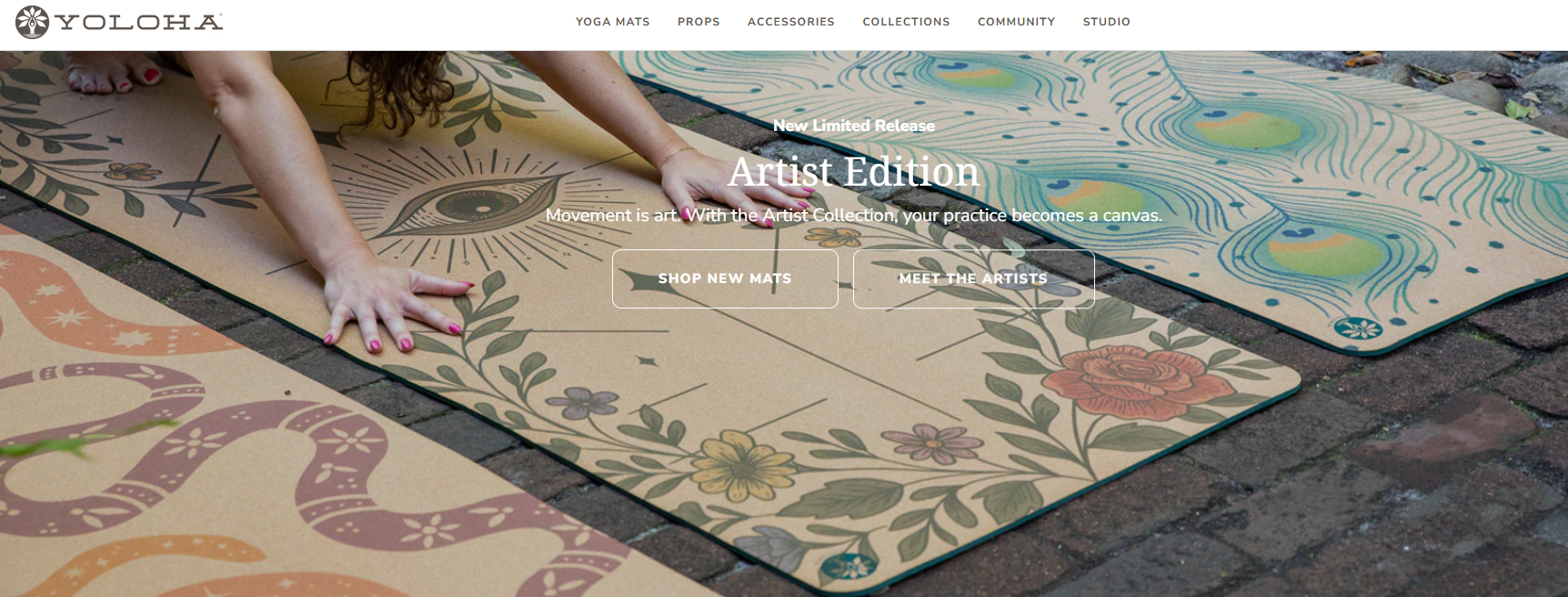
Cork Advantages:
-
Antimicrobial Properties: Cork contains suberin, which resists bacteria and mold
-
Renewable Harvesting: Cork oak bark regrows every 9-12 years without harming trees
-
Self-Cleaning Surface: Cork’s waxy coating repels dirt and requires less washing
-
Temperature Regulation: Cork stays cool in summer, warm in winter
Production Process:
Cork bark arrives in sheets. Workers hand-inspect each piece for quality. They attach cork to natural rubber backing using water-based adhesives. The factory creates zero waste. They convert cork scraps into yoga blocks and meditation cushions.
Mat Options:
-
Original Cork Mat (4.5mm): $88-98, 50% cork surface
-
Nomad Travel Cork (1.5mm): $58-68, folds to briefcase size
-
Aura Cork Mat (5mm): $108-118, 70% cork coverage for maximum grip
-
Native Cork (4mm): $78-88, economy option with standard rubber base
Certifications:
-
FSC Cork sourcing
-
Natural rubber from Rainforest Alliance farms
-
Carbon Neutral Shipping through offset programs
-
B Corporation certified since 2019
Wholesale Programs:
Retailers ordering 20+ mats receive 40% off MSRP. Yoloha provides marketing materials and in-store displays. They offer 60-day payment terms for established accounts.
Packaging Innovation:
Mats ship in bags made from recycled water bottles. Each bag uses 12 post-consumer plastic bottles. The packaging doubles as a mat carrier with shoulder strap.
Manduka (USA) – Sustainable Materials with Lifetime Durability
Location: California, USA with manufacturing in Taiwan
Specialty: Durable mats from recycled and sustainable sources
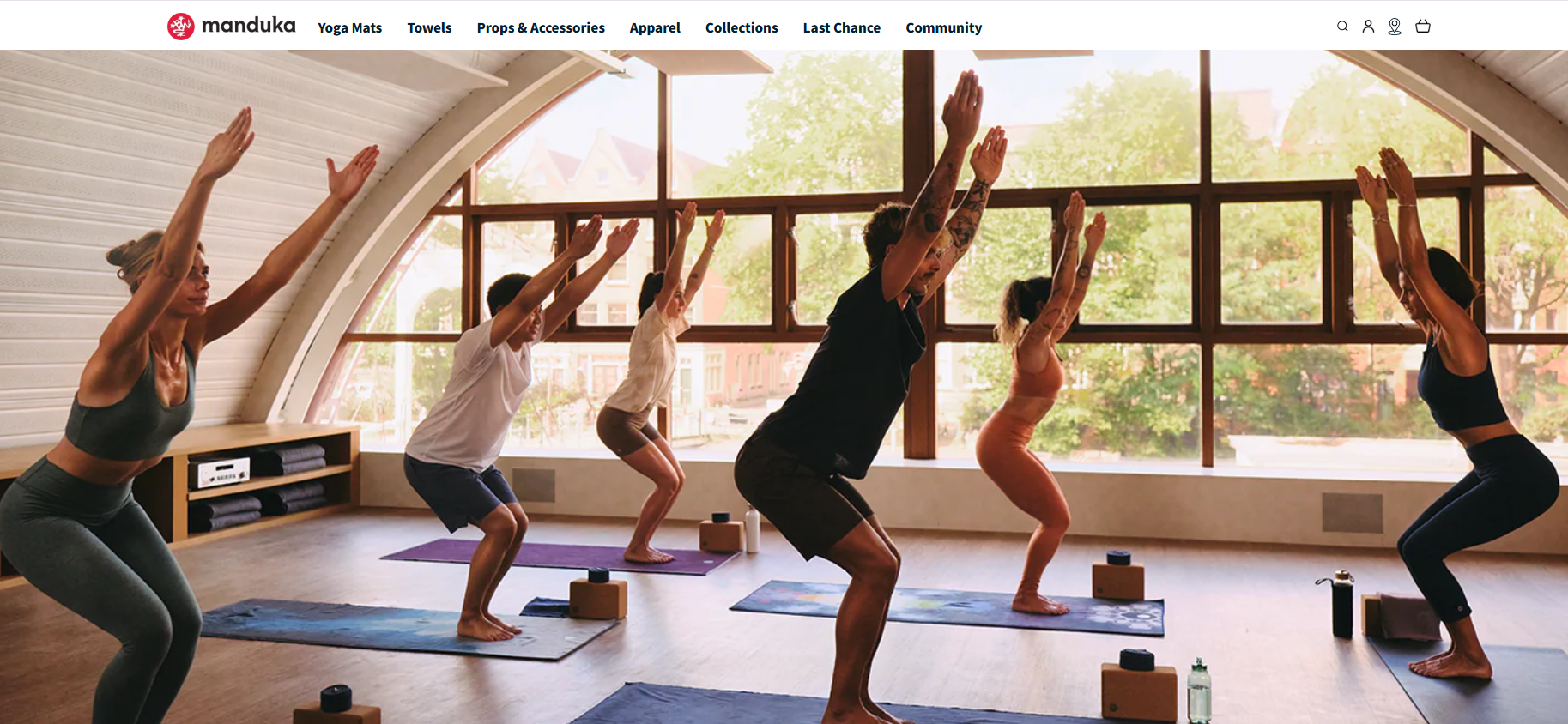
Manduka builds mats designed to last 10-20 years of regular use. This approach reduces waste. It eliminates frequent replacements.
Material Innovation:
PRO Series (Closed-Cell PVC):
Manduka uses emissions-free manufacturing for their PVC-based mats. The material contains no phthalates or heavy metals. Mats last 10+ years. This long life offsets the non-biodegradable material.
eKO Series (Natural Rubber):
– FSC-certified natural rubber from sustainable sources
– Biodegradable within 2-3 years after disposal
– Free from toxic adhesives and dyes
– Available in 3mm, 5mm, and 6mm thicknesses
GRP Series (Recycled Materials):
– Made from recycled wetsuits and yoga mats
– Diverts 15 pounds of material from landfills per mat
– Charcoal-infused for natural odor resistance
– Break-in period of 5-10 uses
Zero Waste Program:
Manduka collects used mats through “Live On” program. They separate materials and recycle components. PVC becomes playground surfaces. Rubber returns to manufacturing.
Pricing Structure:
-
PRO Mat (6mm): $120-140, lifetime guarantee
-
eKO Lite (4mm): $68-78, compact natural rubber for travel
-
GRP Mat (4mm): $78-88, recycled material
-
PRO Travel (2.5mm): $88-98, compact closed-cell
Sustainability Certifications:
-
OEKO-TEX Standard 100 across all lines
-
Certified B Corporation since 2016
-
Carbon neutral shipping options
-
Water-based inks for all printing
Wholesale and Partnership Programs:
Studios ordering 15+ mats receive 30% trade discount. Manduka provides teacher training materials and studio signage. They offer consignment programs for new studios with limited capital.
Manufacturing Transparency:
Manduka publishes sustainability reports each year. The 2024 report shows:
– 42% reduction in water use since 2020
– 67% of energy from renewable sources
– 89% of waste diverted from landfills
– Partnership with 1% for the Planet (donating 1% of sales)
Quality Testing:
Each mat goes through grip testing at 5,000 downward dog cycles. Compression testing simulates 10 years of use. Mats passing all durability tests ship to customers.
Why Partner With a Green Manufacturer
I recommend choosing a sustainable yoga mat factory for more than just environmental reasons. It brings real business benefits. Green manufacturing helps your brand reputation, customer loyalty, and profits.
Consumer Demand for Sustainable Products
The numbers tell a clear story. 73% of global consumers say they would change their buying habits to reduce environmental impact. In the yoga industry, this jumps to 86%.
Market Growth Data:
-
Green yoga mat sales grew 34% year-over-year in 2024
-
Sustainable yoga products command 25-40% higher price points
-
68% of yoga practitioners seek eco-certified mats
-
Studios using green mats report 41% higher member retention
Your customers do their homework before buying. They check certifications. They read ingredient lists. They ask about manufacturing practices. I suggest partnering with verified green factories. You’ll have answers that build trust.
Regulatory Compliance and Future-Proofing
Environmental rules get stricter each year. The EU’s REACH regulation restricts over 200 chemicals in consumer products. California’s Proposition 65 requires warnings for 900+ substances.
Compliance Benefits:
Green manufacturers stay ahead of regulations. They track changing chemical rules. They update products before bans take effect. This protects you from:
-
Product recalls costing $10,000-$500,000 per incident
-
Legal problems from harmful chemical exposure
-
Market access limits in regulated regions
-
Inventory write-offs from banned materials
Traditional PVC mat makers face growing pressure. Several major retailers now refuse PVC yoga mats. Whole Foods banned them in 2023. REI followed in 2024. Target announced phase-out by 2026.
Working with green factories positions you for market access. You avoid expensive product transitions. Your operations adjust smoothly as standards change.
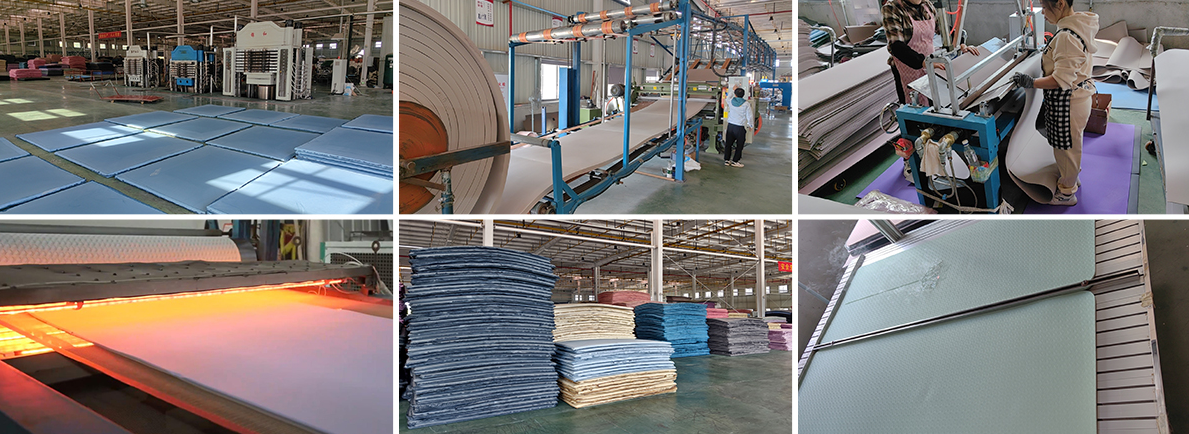
Brand Differentiation in Competitive Markets
The yoga mat market has over 200 active brands. Most sell similar PVC products. I believe green manufacturing creates clear differentiation.
Unique Selling Points:
Working with certified green factories provides specific claims:
-
“Made from FSC-certified natural rubber”
-
“Biodegrades in 18 months, not 500 years”
-
“OEKO-TEX tested for 100+ harmful substances”
-
“Carbon-neutral production with solar energy”
-
“One tree planted per mat sold”
These aren’t vague “eco-friendly” statements. They’re measurable facts. You can prove them with factory certifications.
Marketing Advantages:
Green partnerships generate content. Factory sustainability reports become blog posts. Behind-the-scenes production photos build authenticity. Certification badges increase website trust signals.
Customers share green products more. User-generated content for sustainable mats gets 3x more engagement than conventional products. This expands your marketing reach without extra spending.
Access to Innovation and New Materials
Green manufacturers invest in research. They develop new sustainable materials before mainstream adoption.
Material Innovation Examples:
FDM Yoga created biodegradable TPE rubber mats in 2023. These mats deliver the same durability and grip as traditional PVC mats but naturally decompose in landfills. Partner brands gained access to this innovative technology 18 months ahead of competitors.
Liforme’s GripForMe material took 5 years to develop. It uses plant-based polyurethane instead of synthetic alternatives. Partners who joined first built businesses around this unique material.
First-Mover Benefits:
Working with innovative green factories gives you:
Exclusive distribution agreements for new materials
Lower pricing during product development phases
Input on product design and features
Market leadership position as materials scale
Yoloha Yoga partnered with Portuguese cork yoga mat suppliers in 2015. They secured preferential pricing before cork mats became popular. Competitors entered the market in 2020. Yoloha had 40% cost advantage and established brand recognition.
Risk Reduction Through Quality Standards
Green certifications show manufacturing discipline. Factories earning OEKO-TEX or GOTS certifications maintain strict quality control.
Quality Correlation:
Certified green factories show:
-
0.5-1% defect rates vs 3-5% for uncertified facilities
-
Consistent material composition batch-to-batch
-
Documented testing protocols
-
Traceability to raw material sources
Heathyoga’s ISO 9001 certification requires 100% visual inspection. Their defect rate runs 0.5% with replacement guarantees. This reduces customer complaints and returns.
Operations Stability:
Green manufacturers build long-term supplier relationships. They can’t switch rubber sources without re-certification. This creates stability.
Traditional factories chase lowest prices. They switch suppliers often. This causes quality variations and stock-outs.
Manduka reports 99.2% on-time delivery from their Taiwan facility. The factory maintains 60-day material inventory. They lock multi-year contracts with rubber suppliers. This consistency protects your inventory planning.
Conclusion
The yoga mat industry stands at a turning point. Traditional PVC mats harm both people and the planet. Green alternatives offer real solutions. They protect your health during practice. They break down after disposal. They reduce carbon emissions by 60% compared to synthetic options.
Choose Manufacturers That Match Your Values
I’ve shown you six leading green yoga mat factories in 2025. Each brings different strengths:
-
FDM Yoga delivers custom natural rubber mats with 100-piece MOQs and competitive $8-22 pricing
-
Liforme pioneers biodegradable materials that decompose in 1-5 years
-
JadeYoga plants over 3 million trees through their “Trees for Mats” program
-
Yoloha Yoga specializes in antimicrobial cork with zero-waste production
-
Heathyoga offers wholesale TPE and rubber mats at $6-16 per unit for high-volume orders
-
Manduka builds lifetime-durability mats with take-back recycling programs
I suggest partnering with manufacturers investing in this innovation. They’ll provide materials before mainstream adoption. You’ll build brand leadership. Your competitors will play catch-up. Early advantages in sustainable products create lasting difference.
Choose suppliers treating sustainability as core operations. Avoid marketing spin. Real green factories measure water recycling rates. They track energy sources and carbon footprints. They publish transparency reports. They earn third-party certifications. They build long-term relationships based on shared values.
Your yoga mat choice affects your customers’ health. It impacts the environment. It drives business success. Make it count. Select eco-certified suppliers. Build your brand on genuine sustainability. Profit while protecting the planet.

